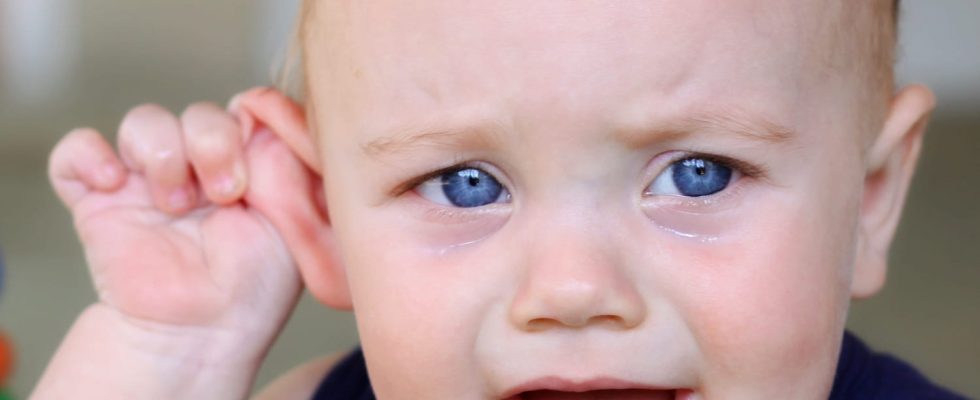It is rare to find children who have not experienced ear infections after attending nursery or kindergarten. However, things get complicated when the child develops serous otitis. Although often asymptomatic, this condition can lead to serious complications, including hearing loss.
Serous otitis in babies is characterized by accumulation of mucus in the part of the ear called the middle ear. Certain symptoms should alert you and lead you to consult a doctor. What are the causes? when to worry serous otitis in babies? How to establish the diagnosis ? What are the treatments (and natural remedies) to treat it? What about the plane ?
Definition: what is serous otitis in babies?
Serous otitis East an accumulation of mucus in the middle earthe part that contains the ossicles of the ear: hammer, anvil, stirrup.
What are the symptoms of serous otitis in babies?
It is often asymptomatic. Sometimes it can have a slight twinge due to the hyperpressure of the liquid, sometimes also a full-ear feeling with bubble noises when blowing your nose or swallowing. The risk is therefore to miss it. However, there are signs that can alert you: if you have the impression that your baby no longer babbles or reacts to noisesthat your child speaks louder than his friends and that he has language disorders, consult a doctor as soon as possible.
What are the causes of serous otitis in babies?
Normally, the natural secretions that regularly form in the middle ear drain down the throat through the Eustachian tube. Gold, due to a dysfunction of the fallopian tube, common in young children, enlarged adenoids or an allergy, sometimes it gets clogged. “Normally eliminated secretions stagnate and then accumulate in the middle ear resulting in decreased mobility of the eardrum and therefore, a less good transmission of sounds“, specifies Dr. Pierre Popowski, pediatrician.
The practitioner will perform a examination of the eardrum using an otoscope (small magnifying glass fitted with a light) to confirm the presence of serous otitis, which he can confirm by performing a tympanometry. “If necessary, he will ask for confirmation by the ENT who will carry out a hearing test (audiometry) your child to measure their hearing abilities“, adds Dr. Popowski.
When to worry about serous otitis in babies?
From the first signs of the disease. “Especially if there is any doubt about the child’s hearing ability“, says Dr. Popowski.
To begin with, saline treatment to unclog the nasal cavities as well as anti-inflammatories and mucoregulators to unclog the Eustachian tubes is set up over a period of one month. At the end of this treatment, the doctor will carry out a new examination, possibly with a tympanometry. If necessary, he can ask the ENT for confirmation that hearing has returned to normal. If that is the case, the prescription of an immunostimulating nasal spray sufficient to prevent any recurrence.
In case of otitis, air travel is not recommended for children
► Otherwise, surgery may be needed in order to set up one or trans-tympanic drains also called “yo-yo“.”These are very small plastic tubes inserted, under general anesthesia, through the eardrum, explains the pediatrician. They compensate for dysfunction of the Eustachian tube by ensuring good drainage of the middle ear in order to avoid any complications or relapses. They will fall off on their own, three to five months after their installation, when the healing is effective, without this posing the slightest problem.“, explains our interlocutor.
Turn to homeopathy. This treatment is to be taken for one month, before a new medical check-up:
- Kalium Muriaticum 5CH : 3 pellets in the morning
- Mercurius Dulcis 5CH : 3 pellets in the evening
Is flying contraindicated in case of serous otitis in babies?
Yes, in case of otitis, air travel is not recommended for children : the ears being clogged, the pressure in the device risks causing them terrible pain.
What are the risks of serous otitis in a baby?
Without treatment or by dint of recurrences, this can lead to hearing loss that can go as far as deafness.
Thanks to Dr Pierre Popowski, pediatrician.
